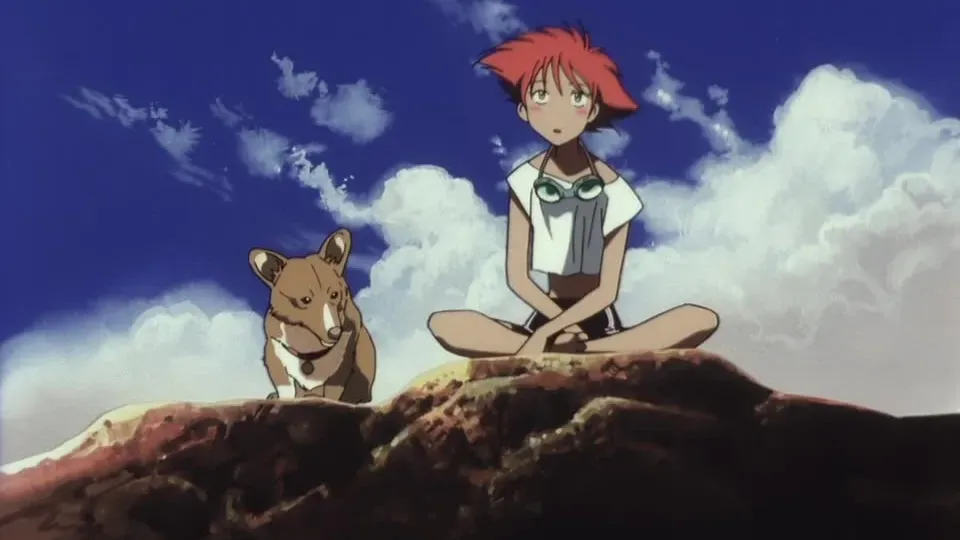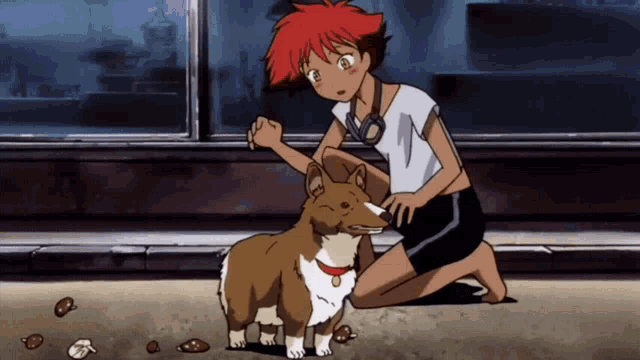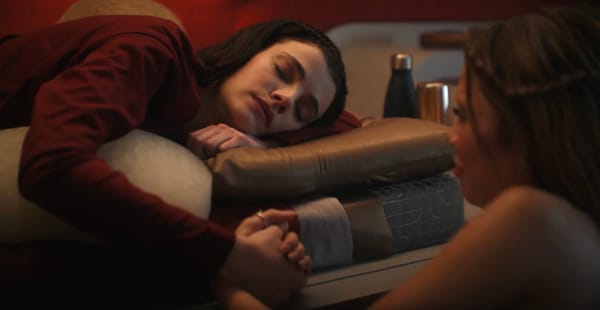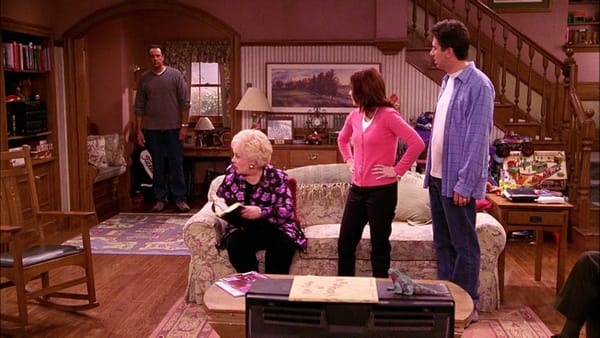Cowboy Bebop: "Mushroom Samba" and "Speak Like a Child"
In which I'm sorry, but this one is going to be all about Faye again.

(This is the ninth installment of my biweekly recaps of Cowboy Bebop, the TV Tokyo animated series that ran from 1998 to 1999 to cult fascination and critical acclaim. I’ve never seen it! These recaps are only available to paid subscribers.)
- “Mushroom Samba” (originally aired February 20, 1999 [Wowow], and October 29, 2001 [Adult Swim])
- “Speak Like a Child” (originally aired June 19, 1998 [TV Tokyo], February 27, 1999 [Wowow], and October 29, 2001 [Adult Swim])

What makes you fall in love with a TV character?
That's a more complicated question for me to answer than what makes me fall in love with a TV show. By and large, the shows I adore have some consistent qualities. I like tonal mishmashes, for instance, and I love when a show can do an episode that comes out of nowhere and floors you with how skillfully it shifts the story's frame. If you've read my criticism or listened to Arden, you likely won't be surprised by these admissions.
What makes me fall in love with a character is trickier, and the answer has been different in different parts of my life. Before I came out to myself, I tended to love whipsmart girls who reminded me of the girl I might have been. (See more here.) In the period when I was out to friends and family privately but still publishing under my old name publicly, I tended to love women whose strength and power were underestimated. (That period was when I tried to convince myself I loved the movie Captain Marvel, and it was when I had a Spider-Gwen avatar just about everywhere.)
Now, though? Hell if I know. I still like plenty of characters who remind me of the women I might have been, and I love a good woman superhero where no one expects to find one. Those types no longer resonate with me as much, however, and if I look at my own work, I see an increasing turn toward self-destructive women defined by tragic pasts who light a bunch of other people on fire on their way out of this plane of existence.
So, yes, this is another newsletter about Faye Valentine.
Faye, past and present
If you've read these recaps straight through, you will know that I resisted Faye for a long time. Her outfit was too cartoonishly sexy, and her childlike behavior seemed to play into stereotypes I had never liked. However, the more I watched the show, the more I understood that Cowboy Bebop paired Faye with Spike not for romantic reasons but because the two resonated in other ways. All of the characters on this show (save Ed, maybe) are defined by their inability to escape a tragedy in their past. It's the one thing that unites the main characters to even the most minor guest stars of the week. And the two most tragic backstories of all, defined by devastating betrayals and a loss of one's sense of self belong to Spike and Faye.
Jet, too, arguably has a tragic backstory on par with his crewmates, but I would say that he has a more classic film noir backstory, where he remembers what happened but has never known certain particulars. Contrast that with the deep mystery surrounding Faye and the Gothic tragedy of Spike, and I think you'll see what I mean. Faye and Spike run to extremes, while Jet's backstory is more common for the genre.
The more time I spent with Faye, the more I started to understand that she was a woman running away from something and trying on new identities in hopes of finding something. As such, hopping on board the Bebop, a ship full of people on the run, was a great pit stop for her before she found something more permanent. Her sexy outfit and her childlike demeanor ended up being ways for her to get others — especially men — to underestimate her so that she might get what she wanted out of a situation. But the show also frequently acknowledged the limits of her guardedness. She closed herself off from people who might have helped her understand her mysterious past, to the degree that when she decided to infodump about it, she gave her monologue to a dog. Faye is so defined by not knowing who she was before she was frozen that she goes out of her way to not create a definitive identity in her adult life. She has turned herself into a literal fill-in-the-blank question.
(Sidebar: I'm starting to understand better why I so resonate with her.)

Anyway, "Speak Like a Child" has one of the great endings in TV history. I haven't done a lot of digging to figure out what the discourse has been like around the series over the years, so maybe everybody else who loves this show hates this episode. But it hit me with an enormous wallop, even though I knew the ending was coming!
More or less my entire understanding of what's coming in the show is guided by its Wikipedia plot summaries, which are quite sparse, generally setting up the premise of the episode and including little other information. And yet the plot summary for "Speak Like a Child" basically gives away the entire story. It reads:
While Faye wastes money betting on horse racing, a package addressed to her arrives on the Bebop containing an old Betamax tape, prompting Spike and Jet to look for an appropriate device to view its contents. The tape proves to be a time capsule recording made by a teenage Faye, but Faye finds her pre-amnesia self unrecognizable.
So when I watched "Speak Like a Child" and realized that the entirety of the plot involved Spike and Jet trying to find a way to view the tape delivered to Faye, I felt a slow-building sense that the episode was going to conclude with a "twist" ending about the tape's contents. I felt myself getting preemptively disappointed.
To be fair to my suspicions, the episode essentially plays out like I assumed it would. The fact that the tape features Faye's teenage self (in what looks like early 21st century Earth) is treated as a twist, and the characters act suitably shocked to see it. But the episode doesn't end with the shock; it ends with Faye's inability to connect her grown self to the girl she sees onscreen. She's devastated by what she sees on the tape, because despite featuring a vision of her past self, it mostly reminds her of everything that was taken from her. When past Faye lets present Faye know that she's cheering her on, it feels less like a pep talk and more like a cruel joke. There was, at one time, a Faye who was supposed to grow up in some other way and have some different life, and then someone took that from her. Now she's left with visions of another self that make no sense.
It's a perfect ending!
Plenty of shows have used the plot device of the secret videotape that provides information on a question the audience has been pondering. Lost, for instance, turned to that device several times throughout its run, because its characters were often seeking information alongside the audience. Where "Speak Like a Child" excels is in taking this basic plot device and using it to underscore how unsatisfying any answers Faye finds will be. Sure, she might learn who she was before she was put in cryostasis, but the people in that video with her are either very old or long dead. There's no way to escape that fate.
In thinking about all of this, I've realized that, sure, Faye resonates with me so much because of my transness. (She feels like she's trying on identities; she mourns a girlhood she doesn't really remember; etc.) But she resonates much more with my identity as an adopted person. As I've gotten to know my biological families, I've felt the weird sense of a gravitational pull emanating from a life I never lived. It's often been easy to imagine the version of myself who grew up among these people because we have more in common than I expected to find. Finding yourself amid a past you didn't realize was your past is intoxicating but also very sad. You are confronted with the arbitrary nature of everybody's life in a way that is bracing and raw. Many adoptees don't find their biological families for that very reason.
But me, I gotta know, and so does Faye, and that's why I love her so much. She doesn't know what lurks in her history, but she knows it will be hard to bear. And she looks anyway.
Oh, right, there was a drug trip episode, too
"Mushroom Samba" is a lot of fun, and it falls into the broader subcategory of "dream episodes." When Ed brings back mushrooms she swipes from a man named Domino who peddles those mushrooms, the other crew members of the Bebop have vivid trips that signify... something.
The most notable thing about "Mushroom Samba" is that it confines the trips themselves to maybe 90 seconds of screentime that simply give you the idea of what Spike, Faye, and Jet see in the middle of their trips. Most drug trip or dream episodes spend whole acts on individual characters, larding their dreams up with symbolism and metaphor. (For example, I love the Buffy episode "Restless," but it very much does this.) This one says, "Hey, Spike would seem like he's forever climbing to a place he can't quite get, and Faye would feel like she was buried under massive amounts of water, which makes sense for their characters, right?" And it does, so you go with it.
However, the rest of the episode is a bit of a trifle. The other crew members of the Bebop are taking on such dramatic weight that Ed's relatively uncomplicated stories feel ever more like distractions from the main emotional thrusts of the show. They're welcome, especially when sandwiched in between heavier episodes as "Mushroom Samba" is. But Ed's adventures in drug running and tracking down Domino to save her crewmates have that weird late '90s feeling of a show that isn't quite doing anti-drug propaganda but also is pretty sure drugs are unsavory. They're not bad; they feel a little inessential this late in the show's run.
One thing I do like: The first five minutes of this episode underline that Cowboy Bebop's view of space travel is rooted in the idea that it would probably really suck to be adrift amid the stars for as long as you would have to be. The crew quietly starving as they wait to crash land on Europa is just the right level of grim. You never worry that they'll die or anything, but the show very much reminds you of how hard it would be to be stuck in space with the same small handful of people for months or even years.
Beyond that, though, I was forgetting this episode almost as soon as it was over. It's a fun little diversion, but I'm much more enjoying the show digging into the meat of its characters. That said, it's great that the show can place an episode like this next to one like "Speak Like a Child," and it's great that this episode gave me a perfect gif.

Other thoughts I thought:
- My high school English teacher had us all write letters to ourselves that she promised to send us 10 years after graduating. WELL, SHE NEVER DID! (I actually think they might have been destroyed in a fire, so no worries, Mrs. Schneider.)
- Another great Ein moment in these episodes: Our lil dog buddy is the only Bebop crew member who's not sick of shitake mushrooms by the end of "Mushroom Samba."
- Speaking of the shitake conclusion, I felt like it was a weak turn in an episode that had already felt very lightweight. Yeah, Ed probably wasn't going to be able to tell the difference between different kinds of mushrooms, and yeah, she would let Domino talk her into taking the mushrooms instead of taking him in. But still — a very bland climax to the episode.
- I spent many scenes with the Black characters in "Mushroom Samba" wondering if any Black critics had written about the episode in particular, and I was glad to find Edernst Noncent had at The Dot and Line. Noncent argues the episode leans way too heavily on stereotypes, and I'm inclined to agree.
- Spike kicking the beta tape player in that guy's little workshop gave me heart palpitations. Spike! No! Bad loner hero figure!
- Faye's attempts to chase pure sensation in these episodes lead her to eat a bunch of expired rations and go on a weird gambling sojourn for very little reason. I see you, Faye, and I feel you.
- The "next week on" sequences get a little weirder every week. This time, Ein tells us what to expect in episode 19. Thanks, Ein!
Next time: It looks like we're getting back to some Spike action in "Wild Horses" and "Pierrot le Fou." See you June 6, space cowboy!




